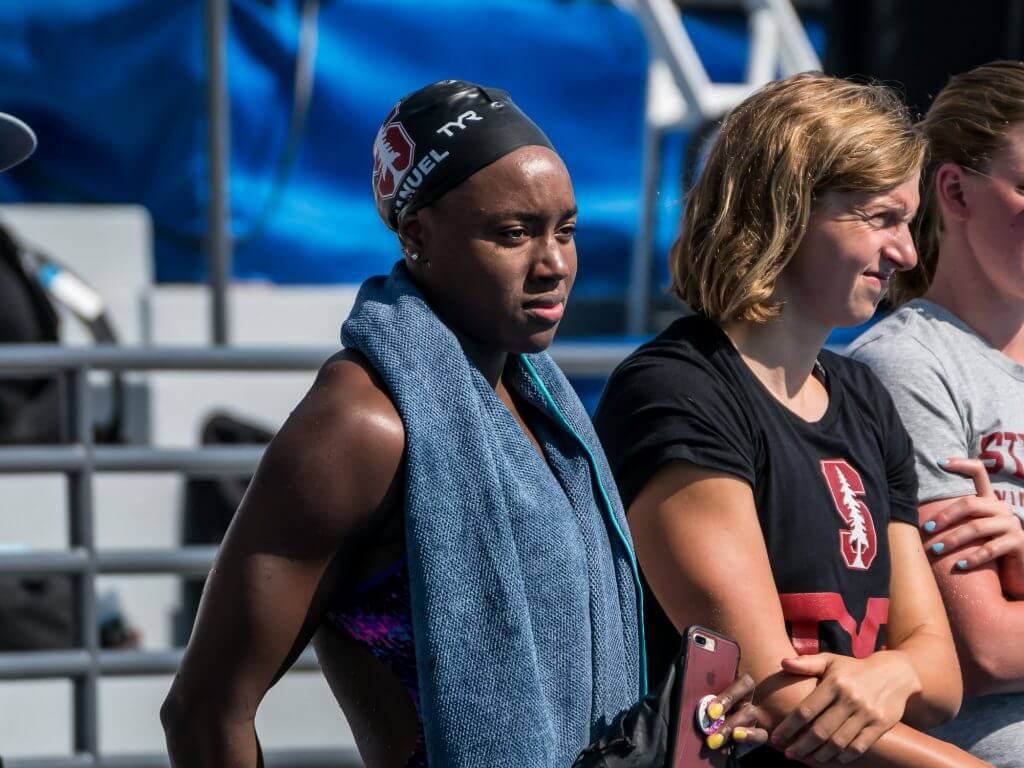Simone Manuel, Katie Ledecky and Natalie Hinds Speak Up on George Floyd Tragedy: ‘Let’s Listen, Engage and Build’

George Floyd
Olympic champions and world record holders Simone Manuel and Katie Ledecky – Stanford teammates – and fellow pro-swimmer Natalie Hinds shared their thoughts on the death of George Floyd on social media on Saturday. Floyd’s name has been heard all around the world the last week following his death after being held down by police officer Derek Chauvin on May 25 in Minnesota. Video shows Chauvin pressing his knee into Floyd’s neck for several minutes and without relenting, despite Floyd stating that he could not breathe.
Floyd was initially taken into custody after a convenience store employee called police and accused Floyd of trying to pay for cigarettes with a counterfeit $20 bill. Chauvin and three other officers arrived on the scene and Floyd was said to be resisting arrest, which led to Chauvin holding Floyd down with his knee. Witnesses at the scene, however, have indicated that George Floyd did not resist. As Chauvin held Floyd down, he showed physical distress and ultimately wen silent. An ambulance was called to the scene and Floyd was pronounced dead at a nearby hospital.
Floyd’s death has caused outrage all over the United States, with protests unfolding in numerous cities, including Minneapolis. Some of the protests have been chaotic, with police involvement necessary. The Floyd incident has also called for an increase in dialogue around the country about race relations, inequality and police brutality.
On Friday, Chauvin was arrested and charged with third-degree murder and manslaughter. Chauvin and the other three officers at the scene, who did not intercede, were all fired on Tuesday.
Ledecky’s longtime teammate Simone Manuel and Natalie Hinds, both African-Americans, expressed their thoughts on George Floyd’s death.
Ledecky shared her thoughts on the situation, explaining to her teammates, friends, and community that she is “here to listen and to comfort. I am here to engage in uncomfortable conversations. And I am here to vote.” By speaking up, Ledecky took a role that is not always embraced by high-profile athletes, that being someone who promotes dialogue, an exchange of ideas and pushes for the betterment of the human race.
— Katie Ledecky (@katieledecky) May 30, 2020
Manuel An Advocate For Change
That Manuel should be deeply pained by the tragic events surrounding the death of George Floyd and what has followed comes as no surprise.
Manuel has been a trailblazer for African Americans in swimming, providing inspiration for many around the United States after she won gold in the 100 freestyle in Rio.
“I think it’s really cool that me swimming up the pool just a couple of times on TV can inspire people to get in the pool and learn how to swim or dream about things that they never thought they possibly could achieve,” she told Swimming World earlier this year.
Manuel grew up in a world where African-American swimmers were the exception, and above all else, that’s the change she wants to see in swimming.
“When I was 12 years old, I came home from swim practice, and I asked my mom why there weren’t many people that looked like me in the sport of swimming,” Manuel said. “We did some research, and we looked up African-American swimmers. Obviously, I knew of Cullen Jones and Maritza Correia, but I learned about Sabir Muhammad and Tanica Jamison and so many others who didn’t quite get the recognition that they deserved in the sport.”
Manuel hopes to help reshape the swimming world so that young African-American swimmers can find more examples of swimmers who look like them. She cringes at any mention of obstacles she still faces due to her race, concerned that such news might turn off African Americans from the sport. Even in swimwear companies’ catalogs and Instagram pages, she resents that models hired to appear alongside sponsored athletes tend to be predominantly white.
“If you start showing some models with African-American children or Asian children or Indian children, then you’re showing people that the demographic is different than just, ‘White people swim,’” Manuel said.
https://www.instagram.com/p/CA0pD0agMB8/
NB: this article was saved in six different updated versions between 4.38pm and 7.56pm on May 20. During that time, the emphasis of a story about Katie Ledecky’s reaction to the death of George Floyd and the events that flowed from it, changed to include the thoughts of Simone Manuel and Natalie Hinds, both African-American swimmers. Simone Manuel reacted to an initial tweet showing only her Stanford teammate Ledecky in headline and photo. She was upset that her significant voice on a matter affecting her community and central to her experience in life appeared to have been demoted to a secondary line. That was never Swimming World’s intention. The day after the upset, we posted an apology and explanation to Simone.




Thank you for intersecting swimming with this momentous and powerful protest. Thank you Katie, Simone!! In the end THIS is what matters.
Powerful protest? If looting liquor stores, burning Auto Zones and cars, and trashing black owned businesses and ruining their lives is your idea of powerful protest, I guess we have a different definition.
Kurt – do you publicly advocate for anti-racist political policy? Do you protest when the US government bombs and kills innocent civilians abroad?
Or do you only publicly complain about people protesting systemic racism?
Jake Des Roches I dont don’t complain about the protesting. The officer involved in my opinion deserves the death sentence for what he did. It’s just the manner of protest that’s problematic I think.
I’ve always admired Katie. Thank you for speaking up for this!
Zero comments
Indeed.